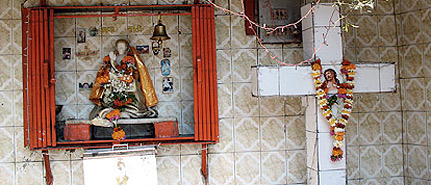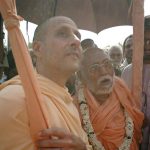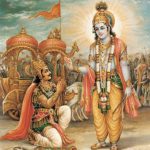A general concept which people hold for Max Müller is that he wrote about the Vedas, and because the Vedas and Upnishads are the prime Bhartiya scriptures, many of the Hindu scholars give him credit for his work. But the fact is that many of them may not have thoroughly studied the writings of Max Müller, or may have a similar opinion about Hinduism as Max Müller had. Thus, in either case, the true quality of his writings remains uncomprehended to such scholars. There is no doubt that Max Müller had great scholarly abilities as studying was his hobby since his childhood, but he used his intelligence to specifically degrade Hinduism by abusing and misrepresenting the theme of the Hindu scriptures. A few places he also wrote a few words like, "If I were asked under what sky the human mind has most fully developed… I should point to India (India, What Can It Teach Us, p. 14)." But, in fact, his such words were only the deceptive appearances which he paraphrasingly used to make Hindus feel good towards him. Factually, he was vehemently and sincerely working for the British, and his extensive writings followed the exact pattern of the British policy to crush the Divine image of the Hindu religion. So he writes that:
• The Vedas are like the twaddles of idiots and the ravings of madmen. Their downright absurdity can hardly be matched anywhere…
• In former times all these victims had been offered. We know it for certain in the case of horses and oxen.
• The Vedas are intended from the beginning for an uncivilized race of mere heathens and savages…
• Sacrifice was a natural occupation for the Vedic savages…
• That Vishnu in India, became in time, an independent deity as Apollo and Dionysus were in Greece.
• The Greek and Indian gods were not beings that ever existed…
• Sanskrit and English are the varieties of one and the same language,..
• Sanskrit, the ancient language of the Vedas, is no more distinct than the Greek of Homer.
• The meaning (of the Vedas) adopted by Sayan was too absurd.
• Chandragupt Maurya was the contemporary of Alexander and Seleucus…
• The Vedas contain a great deal of what is childish and foolish. The strange religion of such strange creatures…
• Vikramaditya who founded the Vikram era certainly did not live in the first century BC…
• The Vedic hymns were created between 1500 and 1000 BC…
• Writing was unknown to India before the fourth century BC…
• The Vedic word Diva (god) meant only 'bright' and nothing else…
• Even the killing and eating of a cow must have been fully recognized at these feasts when the Sutras were written…
• The Aryans migrated into India into the land of seven rivers and composed the hymns of the Ved.
• It is easy to call these utterances (of the Vedas) as childish and absurd…
Max Müller seems to have a great affinity for words like, savages, heathens, absurd, horse and cow eating etc., that's why he uses them frequently in his writings.
He abuses supreme Creator God Vishnu by comparing Him with a Greek fictitious god Apollo and the promoter of a savage cult, Dionysus; compares the eternally perfect Sanskrit language with the primitive Greek language of Homer; condemns the authentic translations of the Vedas by Sayan; disdains the Great Vikramaditya who started the historical Vikram era; infers that Vedic gods never existed just like Homeric gods and Diva (= god only means 'bright' and nothing else); and also says that the writing system in India started only after the 4th century BC.
Every orthodox Hindu knows that Ved Vyas rewrote all of the scriptures and taught them to his disciples. Any Hindu who has even the least understanding about the Hindu religion could see that Max Müller's writings are extremely prejudiced. Also, his translations are misleading. We will give you one example of his Vedic translation.
In the last chapter of "India, What Can it Teach Us" on page 259 Max Müller translates some verses of the Kathopnishad.
Take Max Müller's translation of one verse:
"The wise (man), who by means of meditating on his self recognizes the Old (the old man within) who is difficult, to see, who has entered into darkness, who is hidden in the cave, who dwells in the abyss, as God, he indeed leaves joy and sorrow far behind."
How wrong this translation is, you yourself can see. The actual verse is:
"The patient and determined devotee who selflessly unites his heart and mind to the supreme God in totality (with His Grace) recognizes Him, Who is very difficult to perceive, Who has His eternal Divine form, Who is omnipresent, Who is hidden behind his own personal power (yogmaya), Who resides in the depths of every human heart, and Who is also omnipresent in the material denseness of the world. Such a devotee crosses the cosmic ocean of sorrows and passions."
Max Müller translates "God's personal eternal form" as, "the old man;"The omnipresent God Who is hidden behind His own personal power, yogmaya" as, "(God) Who has entered into the darkness." And "(God) Who is omnipresent in the material denseness of this cosmos" as, "(God) Who dwells in the abyss." Just compare "the eternal personal form of God" with "the old man;" and "God Who is omnipresent in the cosmos" with "God Who dwells in the abyss." How badly and deliberately the Sanskrit terms are misinterpreted.
There are certain Sanskrit words that could not be translated into a few words so they should be used in their original form, but Max Müller and his followers have mutilated all of them. For example: the word hiranyagarbh denotes a state of the manifested form of maya which is associated and represented by God Himself and which holds and contains all the worlds within. This word hiranyagarbh is translated as 'the golden germ' by Max Müller and all the others. God Shiv is also called Pashupati because He is the kind Lord of the souls. Pashu word here relates to the souls. But His name is translated as 'Lord of the creatures,' just to demean His Divine personality. There is a word garbh grih which means 'the inner chamber of the temple,' but it is translated as 'the womb house.' Like this, many of the Sanskrit terms were misinterpreted and wrongly translated.
In this way, the translation of the Vedas by Max Müller was a deliberate attempt to demean the Vedic religion, Vedic Rishis and the Vedas themselves by wrongly interpreting the theme of the Vedic verses. It was all done according to the secret instructions of the British. On one side Max Müller abused the unblemished eternal Vedas, the eternal Divine form of God, the great Masters, Rishis and acharyas, and on the other side he praised Christianity which was formed on prejudicial grounds (pp. 150, 155). He also praisingly mentioned about Ram Mohan Roy and Keshab Chandra Sen in his writings because they were against Vedic religion and were the critics of all Vaishnav acharyas.
Ram Mohan Roy was an atheist. He did not believe in the descensions of God or the writings of the acharyas. He disregarded Vedic religion, criticized Hindu customs and rejected the teachings of all the Jagadgurus. Pretending to be believing in an impersonal spiritual existence, he wore the appearance of an orthodox Hindu but his heart was fully Christianized. That's why when he visited England, he was well received by the Britishers and was admired for his Christian bent.
In 1828 he established the Brahmo Samaj in Calcutta on the same lines of his non-Vedic faith and tried to encourage western style of education in the country. Ram Mohan Roy died in Bristol, England. The third leader of Brahmo Samaj, Keshab Chandra Sen (in 1866), worked on the same lines as Ram Mohan Roy with some modifications, but, during the 20th century the Brahmo Samaj slowly died out.
Max Müller praises Christianity
He writes in the "Physical Religion" on pages 203 and 364:
"There are some portions of the Bible which, I believe, most Christians would not be sorry to miss. But that is nothing in comparison to the absurd and even revolting stories occurring in Sanskrit books which are called sacred. In that respect it is quite true that there is no comparison between our own sacred book, the New Testament, and the Sacred Books of the East."
"It would be simply dishonest on my part were I to hide my conviction that the religion taught by Christ, and free as yet from all ecclesiastical fences and entrenchments, is the best, the purest, the truest religion the world has ever seen."
Those who have carefully studied the New Testament and read the history of Christianity they fully know that the bishops of the Christian religion used the best method to suck the public money by selling indulgences; introduced the purest form of spine chilling cruelty through the enforcement of the Inquisition where millions of innocent men and women were tortured, burned at the stake and killed; and the first promoters of Christianity incorporated the truest image of their primitive living into Christianity by using swear words, calling Jesus 'the lamb,' introducing the Eucharist (their religious ceremony, which represents the flesh and blood of Jesus in an edible form), and, in the kingdom of God, decorating even God's supper with abominable varieties of meat (in the Revelation 19/ 17,18). Was Max Müller unaware of such absurd and even revolting facts of Christianity and the Christian movement which have no compare?
Certainly he knew about these dark images of Christianity, that's why he indicated in one of his letters (August 25, 1856) that religion-wise there is nothing to do in England except help polishing a few ornaments of a cathedral which is rotten at the base.
He also knew that the true meaning of the Vedic verses are deep and profound which cannot be understood through learning the mere meaning of its words. Thus he mentions in "The Vedas" chapter III p. 49:
"Besides, their language is so difficult that, as yet, it makes a satisfactory translation of the whole Veda a perfect impossibility… The Vedic hymns on the contrary, even when we understand every word of them, remain very obscure in their structure or construction."
In the back of his mind He knew that the date of the Vedas is much older than what he had established. So, in the flow of speaking, while lecturing 'on the age of the Vedas,' it casually came out from his mouth, that:
"If now we ask how we can fix the date of these periods, it is quite clear that we cannot hope to fix a terminus a quo. Whether the Vedic hymns were composed 1000, or 1500, or 2000, or 3000 years BC, no power on earth will ever determine." ("Physical Religion" Lecture V, p. 91)
He also realized that Vedic descriptions are well coordinated with their subject matter so it is not easy to isolate a criticizable verse. But he had to do it because that's what he was paid for. So he says that, "It is rather hard to have to pick out childish and absurd thoughts, in order to prove the primitive and unsophisticated character of the Veda. But if it must be done, it can be done." ("Physical Religion" Lecture V, p. 101)
Max Müller knew about the negative sides of his own religion, Christianity, and he also knew about the positive aspects of Hindu religion, yet, for his whole life, he criticized Hindu religion by all means. Why did he do so? Because he was especially employed for this job by the British.
The British government during the time of Queen Victoria of England had agreed to pay Max Müller an extravagant price for every single sheet of such abusive writings. It was thus the warmth of the money for a poor scholar of those days that made him do such a thing, and also it was the negativity of his own mind that induced him to accept such a job.
{mospagebreak title=Page 2: Revealing Letters}
Letters of Max Müller
First published in 1902 (London and N.Y.). Reprint in 1976 (USA).
(1) To his wife. Oxford, December 9, 1867:
"…I feel convinced, though I shall not live to see it, that this edition of mine and the translation of the Veda will hereafter tell to a great extent on the fate of India, and on the growth of millions of souls in that country. It is the root of their religion, and to show them what that root is, I feel sure, the only way of uprooting all that has sprung from it during the last 3,000 years."
(2) To his mother, 5 Newman's Row, Lincoln's Inn Fields, April 15, 1847:
"I can yet hardly believe that I have at last got what I have struggled for so long… I am to hand over to the Company, ready for press, fifty sheets each year; for this I have asked £200 a year, £4 a sheet. They have been considering the matter since December, and it was only yesterday that it was officially settled."
"…In fact, I spent a delightful time, and when I reached London yesterday I found all settled, and I could say and feel, Thank God! Now I must at once send my thanks, and set to work to earn the first £100."
(3) (a) To Chevalier Bunsen. 55 St. John Street, Oxford, August 25, 1856:
"India is much riper for Christianity than Rome or Greece were at the time of St. Paul. The rotten tree has for some time had artificial supports… For the good of this struggle I should like to lay down my life, or at least to lend my hand to bring about this struggle. Dhulip Singh is much at Court, and is evidently destined to play a political part in India."
"I should like to live for ten years quite quietly and learn the language, try to make friends, and then see whether I was fit to take part in a work, by means of which the old mischief of Indian priestcraft could be overthrown and the way opened for the entrance of simple Christian teaching… Whatever finds root in India soon overshadows the whole of Asia."
"Much more could be said about this; a wide world opens before one, for which it is well worth while to give one's life. And what is to be done here? here in England? here in Oxford? nothing but to help polish up a few ornaments of a cathedral which is rotten at the base."
(b) To the dean of St. Paul's (Dr. Milman). Staunton House, Bournemouth, February 26, 1867:
"I have myself the strongest belief in the growth of Christianity in India. There is no country so ripe for Christianity as India, and yet the difficulties seem enormous."
(c) To the duke of Argyll. Oxford, December 16, 1868:
"India has been conquered once, but India must be conquered again, and that second conquest should be a conquest by education. Much has been done for education of late, but if the funds were tripled and quadrupled, that would hardly be enough… A new national literature may spring up, impregnated with western ideas, yet retaining its native spirit and character… A new national literature will bring with it a new national life, and new moral vigour. As to religion, that will take care of itself. The missionaries have done far more than they themselves seem to be aware of."
"The ancient religion of India is doomed, and if Christianity does not step in, whose fault will it be?"
(4) (a) From the diary of Max Müller. Bonn. March 6, 1845:
"I get up early, have breakfast, i.e. bread and butter, no coffee. I stay at home and work till seven, go out and have dinner, come back in an hour and stay at home and work till I go to bed. I must live most economically and avoid every expense not actually necessary. The free lodging is an immense help, for unless one lives in a perfect hole… I have not been to any theatre, except one evening, when I had to pay 2 francs for a cup of chocolate, I thought 'Never again'."
(b) To his mother. Paris, December 23, 1845:
".. .instead of taking money from you, my dearest mother, I could have given you some little pleasure. But it was impossible, unless I sacrificed my whole future… I have again had to get 200 francs from Lederhose, and with the money you have just sent shall manage till January or February."
(c) To his mother. Paris, May 24, 1846:
"Baron Cetto has written to me three times from there with new proposals. Perhaps I shall give private lessons, but am sure to make a little money by Sanskrit commissions."
(d) 46 Essex street, Strand, London. June 13, 1846:
"My dear mother. Here I am really in London… I had many expenses those last days, and I am all the more grateful for the thirty thalers you put up with the shirts; the orange sugar was confiscated on the frontier."
(5) On April 17, 1855, Bunsen wrote to thank Max Müller for an article on his Outlines:
"You have so thoroughly adopted the English disguise that it will not be easy for any one to suspect you of having written this 'curious article.' It especially delights me to see how ingeniously you contrive to say what you announce you do not wish to discuss, i.e. the purport of the theology. In short, we are all of opinion that your cousin was right when she said of you in Paris to Neukomm, that you ought to be in the diplomatic service!"
(6) (a) To his mother. September 1, 1847:
"My rooms in London are delightful. In the same house lives Dr. Trithen, an orientalist, whom I knew in Paris, and who was once employed in the Office for Foreign Affairs in St. Petersburg. Then there are a great many other orientalists in London, who are mostly living near me, and we form an oriental colony from all parts of the world… We have a good deal of fun at our cosmopolitan tea-evenings."
By the middle of October, Max Müller was able to send the first sheet of Sayan's Commentary to M. Burnouf. To this Burnouf replied on November 9:
"My dear friend. I thank you for having sent me the sheets of your grand edition of the Rig-veda. I use the word grand, because I consider it both grand and excellent… I have examined your sheets, and I must own that I am astonished that in so short a time, you have been able to master the mass of materials at hand."
(b) The following letter from Dr. John Muir, the editor of Original Sanskrit Texts, or the Origin and History of the People of India, (contains the first mention of a man of whom Max Müller always spoke of with reverential affection) 33 Sussex Gardens, June 26, 1854:
"My dear sir, It may interest you to know that there is at present in London a Pundit from Benares, he has become a Christian. He has come to England with the Maharaja Duleep Singh, as a sort of tutor or companion to His Highness. His name is Nehemiah Nilkanth… He is a Sanskrit scholar, being able to write the language accurately and fluently, and having a general knowledge of the philosophical schools… He has latterly been employed as a catechist… Nilkanth, since his conversion, has written a tract in Hindoo against the Veddnta, which is interesting."











